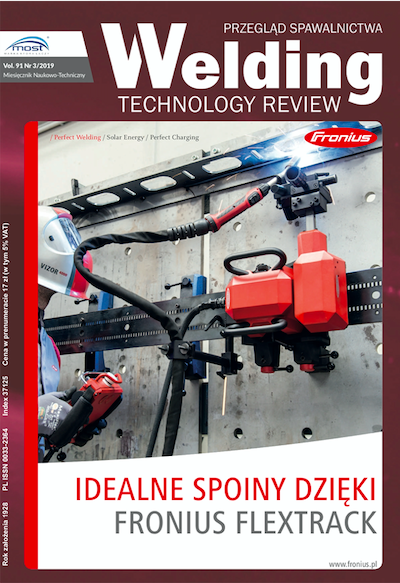Energy intensity as an ecological factor in the selection of the manufacturing process
Main Article Content
Abstract
The article presents the analysis of the implementation of selected elements of car transport in the aspect of ecology. The basic issue that affects the protection of the environment (ecology) is the value of energy intensity in the manufacture of products. The elements made in the production process of plastic mouldings were compared. The amount of energy in kJ needed to produce 1 kg of a given product was estimated. Next, the dependencies between the value of computational energy intensity and the emission of gases affecting the environment of CO2, SO2, NOx were presented. As a conversion factor according to GUS data, it was assumed that 1kWh production in Poland causes emission of 800 g CO2, 7 g SO2 i 3 g NOx.
Downloads
Article Details
Creative Commons CC BY 4.0 https://creativecommons.org/licenses/by/4.0/
Welding Technology Review (WTR) articles are published open access under a CC BY licence (Creative Commons Attribution 4.0 International licence). The CC BY licence is the most open licence available and considered the industry 'gold standard' for open access; it is also preferred by many funders. This licence allows readers to copy and redistribute the material in any medium or format, and to alter, transform, or build upon the material, including for commercial use, providing the original author is credited.
References
Haratym R., Kolasa A., Ecological production the machnes parts (Ekologiczne wytwarzanie części maszyn), Oficyna Wydawnicza PW, Warszawa (1997).
Mikucki O., Energii K.A.P. (2005). Energochłonność jako czynnik nowoczesnej gospodarki. Czysta Energia (8).
Salonitis K., Ball P., Energy Efficient Manufacturing from Machine Tools to Manufacturing Systems, Procedia CIRP, 2013, Vol. 7, 634- 639. DOI: https://doi.org/10.1016/j.procir.2013.06.045
Bunse K., Vodicka M., Schönsleben P., Brülhart M., Ernst F.O., Integrating energy efficiency performance in production managementgap analysis between industrial needs and scientific literature, Journal of Cleaner Production, 2011, Vol. 19(6-7), 667-679.
DOI https://doi.org/10.1016/j.jclepro.2010.11.011 DOI: https://doi.org/10.1016/j.jclepro.2010.11.011
Behrendt T., Zein A., Min S., Development of an energy consumption monitoring procedure for machine tools. CIRP annals, 2012, Vol. 61(1), 43-46.
DOI https://doi.org/10.1016/j.cirp.2012.03.103 DOI: https://doi.org/10.1016/j.cirp.2012.03.103
Jaworski J., Kluz R., Trzepieciński T., Managing the tooling service in body production line. Journal of Manufacturing Technologies, 2015, Vol. 40(1), 41-46.
Soroczyński A., Regeneration of Foundry and Core Masses Journal of Manufacturing Technologies, 2018, 41(4), 29-33.
Liu K., Bai H., Wang J., Lin B., How to reduce energy intensity in China's heavy industry—Evidence from a seemingly uncorrelated regression. Journal of Cleaner Production, 2018, Vol. 180, 708-715.
https://doi.org/10.1016/j.jclepro.2018.01.170 DOI: https://doi.org/10.1016/j.jclepro.2018.01.170
Lewandowski W.M., Proekologiczne odnawialne źródła energii. 2012, 322-347. Wydawnictwa Naukowo-Techniczne.
Krawiec F. (Ed.). Odnawialne źródła energii w świetle globalnego kryzysu energetycznego: wybrane problemy. Difin. Ochrona środowiska 2017, GUS Warszawa 2017
Ruszaj A., Wybrane aspekty bioinspiracji w rozwoju przemysłu. Welding Technology Review, 2018, Vol. 90(3), 52-56. DOI: https://doi.org/10.26628/ps.v90i3.869
Weinert N., Chiotellis S., Seliger G., Methodology for planning and operating energy-efficient production systems, CIRP annals, 2011, Vol. 60(1), 41-44.
DOI https://doi.org/10.1016/j.cirp.2011.03.015 DOI: https://doi.org/10.1016/j.cirp.2011.03.015
Garbarski J., Fabijański, M., Ograniczenie dymotwórczych właściwości tworzyw sztucznych na przykładzie wysokoudarowego polistyrenu, 2004, Polimery, Vol. 49(4), 283-286. DOI: https://doi.org/10.14314/polimery.2004.283
Fabijański M., Wielokrotne przetwórstwo polilaktydu, Przemysł Chemiczny, 2006, Vol. 95(4), 874-876.
Badia J.D., Ribes-Greus A., Mechanical recycling of polylactide, upgrading trends and combination of valorization techniques, European Polymer Journal, 2016, Vol. 84, 22-39. DOI: https://doi.org/10.1016/j.eurpolymj.2016.09.005
Sikorska W., Richert J., Rydz J., Musioł M., Adamus G., Janeczek H., Kowalczuk M., Degradability studies of poly (L-lactide) after multi-reprocessing experiments in extruder. Polymer degradation and stability, 2012, Vol. 97(10), 1891-1897. DOI: https://doi.org/10.1016/j.polymdegradstab.2012.03.049
Gospodarka Paliwowo energetyczna w roku 2013/2014, GUS Warszawa 2015
